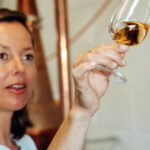Bayside Rum Co., Founder: EGOR PETROV
Bayside Rum Co. was established in 2020 by Egor Petrov and Anna Saveleva with a mission to put New Zealand-made Pure Single Rum on the map. Egor has been in the Food & Beverage industry for over 14 years, closely working with spirits and cocktails.
Egor’s passion for mixing cocktails has led him to learn everything about the ingredients that are used, down to how spirits are produced. This is where Egor’s desire to create his own brand came from and rum is the perfect platform for being creative while respecting the traditions of rum production.
Anna has been painting since she was little and this passion grew into a fulfilling career through which Anna got to work with some of the biggest names in the magazine industry, including Harper’s Bazaar and Vogue. Anna creates the overall look and feel of Bayside Rum Co with inspiration, leading her design process. Learn more about them, in the next interview.
TRL: What does the rum mean to you? What made you fall in love with rum and when did it happen?
Bayside Rum Co. is my second child, the first one being my actual daughter Matilda. While prior to launching Bayside Rum Co, I enjoyed working with rum for its versatility, I’ve truly fallen in love with the rum category since I started making my own. There is so much history and diversity in rum that makes it a culturally important spirit, but there are also so many traditional ways of making rum that make it a very creative category as well, for example, the spiced and botanical rums from the Caribbean. I think what’s important is rum’s ability to bring different people and cultures together by giving everyone something they will enjoy.
TRL: Three essential characteristics that define the rum according to your perspective.
Bayside Rum is defined by its unique Kumara (sweet potato) fermentation starter, inspired by Batavia Arrack. It is distilled in 100% copper New Zealand-made stills. And it’s rested in barrels and casks that have been used by the beverage industry in New Zealand, currently, we are resting rum in ex-Pinot Noir and ex-Chardonnay barrels, with ex-beer and ex-NZ whisky barrels to join soon.
TRL: What is the most important contribution you have made in the rum industry?
We’re still a young brand but our mission is to put New Zealand made rum on the rum-map.
TRL: Benefits that the rum industry has given you.
I’ve met many like-minded people that seem to have an obsession with rum and it makes you feel you’re part of something special. Rum connoisseurs are serious about rum, while with some other popular spirit categories, that’s not the case. I’ve learned many new skills and have been able to pursue my dream of creating my brand and don’t see myself doing anything else.
TRL: What’s another thing you are passionate about, besides rum? Why?
I am passionate about the hospitality industry, as that was my first career path. Hospitality is riddled with issues and especially mental health, with very little support for some of the most vulnerable people that are some of the hardest workers while staying humble. So I want to use Bayside Rum Co as an opportunity to help people in the hospitality industry with their issues – one great initiative that I have been a part of is Healthy Hospo, with which we’ve established a run club and it has been literally a life changer for me.
TRL: What is your favorite place for drinking rum?
With friends around the kitchen counter late into the night. I enjoy making cocktails for friends and naturally rum is something everyone enjoys.
TRL: Favorite drink + Recipe
At the moment, I am really enjoying a twist on a Mai Tai, where orange curacao is replaced with a bit of bitter apéritif like Campari. In New Zealand, we have our own organic alternative to Campari, which means I can make a 100% New Zealand twist on a Mai Tai that I call Haere Mai Tai (Haere Mai means Welcome in the local Maori dialect).
TRL: Why is it important to educate the rum consumer?
Because there are very vague laws and regulations around what good quality real rum is unless you drink rum from Martinique. Far too often, people will gravitate towards something that is easier to drink than what real rum is actually all about.
TRL: Any tips to train the palate and taste a good premium rum?
Drink rum the way you know you’ll enjoy it, even if it’s with cola. Start somewhere familiar and try adding less mixer with time, hopefully eventually landing you on trying rum neat first before you try it mixed. Also, go to a rum bar and get a flight of different styles and talk to the bartenders.
TRL: How can rum contribute to improving the crisis in some countries?
By providing tourism, as well as big export opportunities – look at Clairin from Haiti, there’s so much respect for this rum style, but Haitians have been making it this way for a long time without realizing how special it is. Rum tells a story of where it comes from.
TRL: Is the commitment to sustainable development the key to success for the permanence of the rum industry in the world? Why?
Commitment to sustainability is important for any industry right now. I think the most important step to real sustainability is economic growth that makes the life of people involved in rum production better – if rum can help take care of the needs of people, these people will have a better opportunity to help enforce sustainable practices for the better of the world.
TRL: Who would like to meet in the rum industry? What would you say to him/her?
Joy Spence, of course! I consider Jamaican rum some of the most special in the world and Bayside Rum Co has a similar tropical funk profile that Jamaican rum is so famous for. I’d ask Joy – what does the future look like for rum?
TRL: What are your next goals in the rum industry?
I’m going to produce the first-ever New Zealand Agricole rum with sugarcane grown in the tropical far north of New Zealand.
TRL: Plans you have when you leave the rum industry.
If I leave the rum industry, I want to focus on the basic needs of people like affordable, healthy, and sustainable produce.
TRL: Why is the role of the bartender important in the rum industry?
Bartenders are the gatekeepers to understanding and enjoying rum. I truly believe that the gin category is as big as it is today because bartenders refused to use vodka and opted for a spirit with flavor, eventually changing the public’s palate towards gin. We can do the same for rum and it is so much more exciting because rum is so much more versatile.
TRL: What is your advice for new generations in the rum industry?
Learn the history first. It’s important to understand where it all started, so we don’t make the same mistakes again.
TRL: How can people learn more about you? Website? Social media page?
https://www.instagram.com/baysiderumco/https://www.instagram.com/petrovandco/
About The Author
Creative Director for EmpresasFH and Director of HOFFMANNdesign. Born and raised in Caracas, Venezuela, Mr. Hoffmann has been one of the most important designers for prestigious companies in South America, including Disney, Cartoon Network, Mattel among others.





